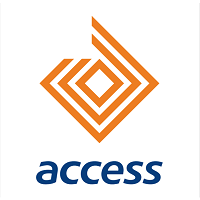Access Bank plc
Access Bank plc, commonly known as Access Bank, is a Nigerian multinational commercial bank, owned by Access Bank Group. It is licensed by the Central Bank of Nigeria, the national banking regulator.[1]
 | |
| Public: NSE: ACCESS | |
| Industry | Banking |
| Founded | 1989 |
| Headquarters | 14/15, Prince Alaba Abiodun Oniru Road, Victoria Island, Lagos, Lagos State, Nigeria |
Key people | Dr. Ajoritsedere Awosika, Chairperson; Herbert Wigwe, Group Managing Director and Chief Executive Officer |
| Products | Loans, Credit Cards, Savings, Investments, Mortgages |
| Revenue | |
| Total assets | US$18 billion (NGN:7 trillion) (2019) |
Number of employees | 28,121 |
| Website | Official site |

Originally a corporate bank, the organization acquired personal and business banking platforms from Nigeria’s International Commercial bank in 2012. Access Bank is presently one of the five largest banks in Nigeria in terms of assets, loans, deposits and branch network. The merger of Access Bank and Diamond Bank on 1 April 2019 has made Access Bank the largest bank in Africa. In conclusion of its merger with Diamond Bank, Access Bank Plc, unveiled its new logo, signalling the commencement of a new enlarged banking entity.
Locations
The bank's headquarters is located in the city of Lagos, the most commercial city of Nigeria. The coordinates of the bank's headquarters are: 6.43337513, 3.44531357 (Latitude:6.43337513; Longitude:3.44531357).[2]
Overview
Access Bank plc is a large financial-services provider. As of December 2015, the bank had an asset base in excess of US$12.2 billion (NGN:2.412 trillion), and shareholders' equity valued at approximately US$1.86 billion (NGN:367.8 billion).[3] (Note that US$1.00 = NGN305 on 15 January 2017.)
Access Bank Group
As of December 2015, Access Bank plc had subsidiaries in eight Sub-Saharan African countries and the United Kingdom.[4]
History
The bank received its license from the Central Bank of Nigeria in 1989, and listed on the Nigerian Stock Exchange in 1998.
- 2002: Access Bank was taken over by a core of new management led by Aigboje Aig-Imoukhuede and Herbert Wigwe.
- 2005: Access Bank acquired Marina Bank and Capital Bank (formerly commercial bank Crédit Lyonnais Nigeria) by merger.
- 2007: Access Bank established a subsidiary in Banjul, The Gambia. This bank now has a head office and four branches, and the bank has pledged to open another four branches.
- 2008: Access Bank acquired 88% of the shares of Omnifinance Bank, which was established in 1996. It also acquired 90% of Banque Privée du Congo, which South African investors had established in 2002. Access Bank acquired 75% of the shares of Bancor SA, in Rwanda. Bancor had been established in 1995 and reorganized in 2001. In September, Access Bank opened a subsidiary in Freetown, Sierra Leone, and then in October, the bank opened subsidiaries in Lusaka, Zambia and in London, United Kingdom.
- 2008: Finbank (Burundi) joined the Access Bank network,[5] but exited the group in 2014.[6]
- 2011: Access Bank was in talks with the Central Bank of Nigeria to acquire Intercontinental Bank plc.
- Intercontinental Bank became a subsidiary of Access Bank plc, which recapitalized the former and acquired a 75% majority interest in its stock.
- The combined effect of the restoration of Net Asset Value (NAV) to zero by AMCON and N50billion capital injection by Access Bank plc is that Intercontinental Bank now operates as a well-capitalized bank, with shareholders funds of N50billion and Capital Adequacy Ratio (CAR) of 24%, well above the 10% regulatory threshold.
- January 2012: Access Bank announced the conclusion of its acquisition of the former Intercontinental Bank,[7] creating an expanded Access Bank, one of the largest four commercial banks in Nigeria with over 5.7 million customers, 309 branches and over 1,600 Automated Teller Machines (ATMs).[8][9]
- 2012: The London High Court indicted former Managing Director of Intercontinental Bank Erastus Akingbola to refund over $1 billion to Access Bank.[10]
- 2018: In December 2018, Access Bank PLC acquires Diamond Bank, the board of Diamond Bank announces that her merger with Access Bank Plc expected to be completed in first half of 2019.[11][12]
- 2020: Access Bank acquires Kenya’s Transnational Bank, including 100 percent of shareholding and 28 branches around Kenya.[13]
References
- CBN (15 April 2016). "List of Financial Institutions: Commercial Banks". Abuja: Central Bank of Nigeria (CBN). Retrieved 15 April 2016.
- Google (1 March 2020). "Location of the Headquarters of Access Bank Plc" (Map). Google Maps. Google. Retrieved 1 March 2020.
- ABP (16 March 2016). "Audited Results for the Year Ended December 31, 2015" (PDF). Lagos: Access Bank Plc (ABP). Archived from the original (PDF) on 1 June 2016. Retrieved 15 April 2016.
- "Access Bank to begin operations in Ghana". ghananewsagency.org. Retrieved 9 March 2018.
- Isenged, Walter (19 May 2009). "Burundi: Finbank to Be Named Access Bank". East African Business Week (Kampala). Retrieved 9 March 2018.
- FBB (14 April 2016). "FinBank Burundi: About Us". Bujumbura: FinBank Burundi (FBB). Retrieved 14 April 2016.
- "Access Bank Acquires Majority Stake In Intercontinental". Modern Ghana. Retrieved 9 March 2018.
- NFA News (17 October 2011). "Access Bank Completes Take Over of Intercontinental Bank". The Nigerian Voice. Lagos. Retrieved 15 April 2015.
- Communities, Nigeria Business. "Access Bank completes Intercontinental Bank's acquisition". nigeriabusinesscommunities.com. Retrieved 9 March 2018.
- "Former Bank Chief To Refund Over $1bn To Access Bank".
- Tony (16 December 2018). "Breaking: Access Bank acquires Diamond Bank". Vanguard News Nigeria. Retrieved 18 December 2018.
- Okogba, Emmanuel (17 December 2018). "Diamond Bank confirms merger with Access Bank". Vanguard News Nigeria. Retrieved 18 December 2018.
- "Nigeria's Access Bank acquires Kenya's Transnational Bank — and its murky past". The Africa Report.